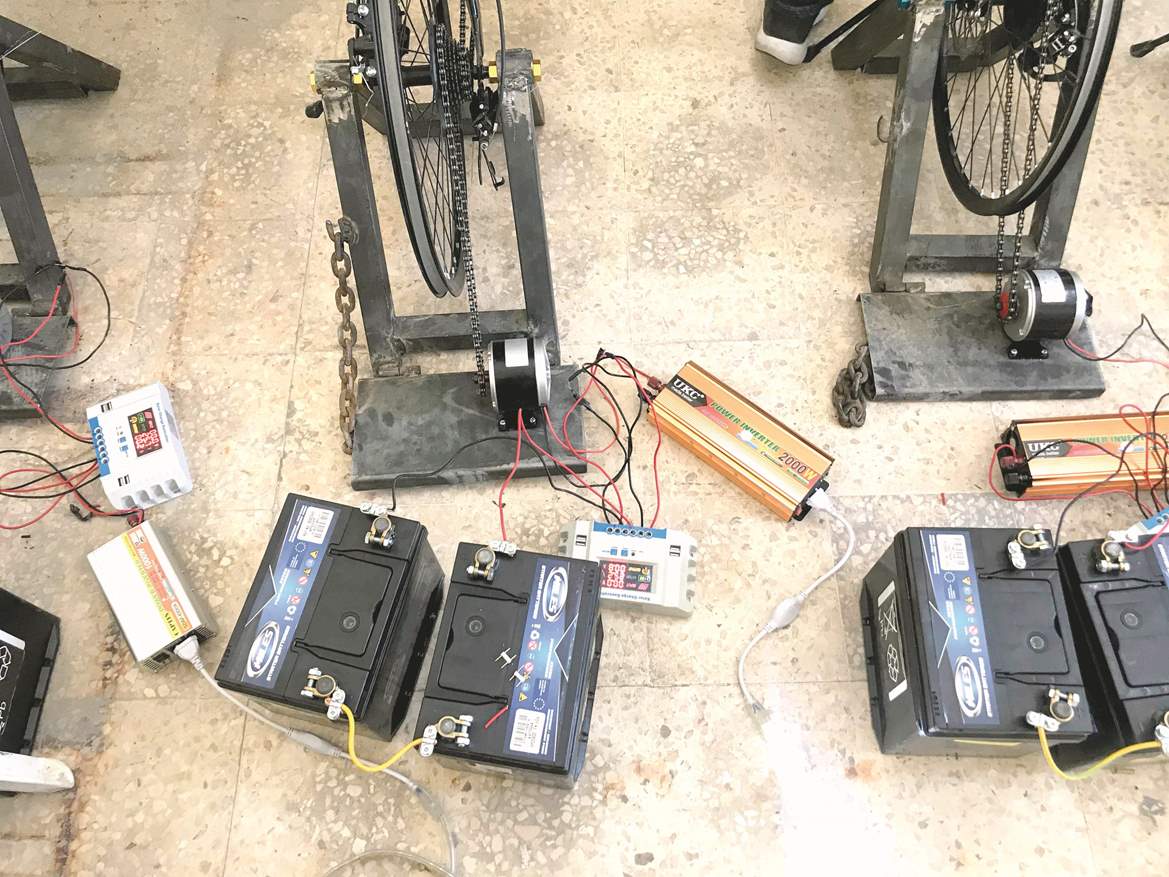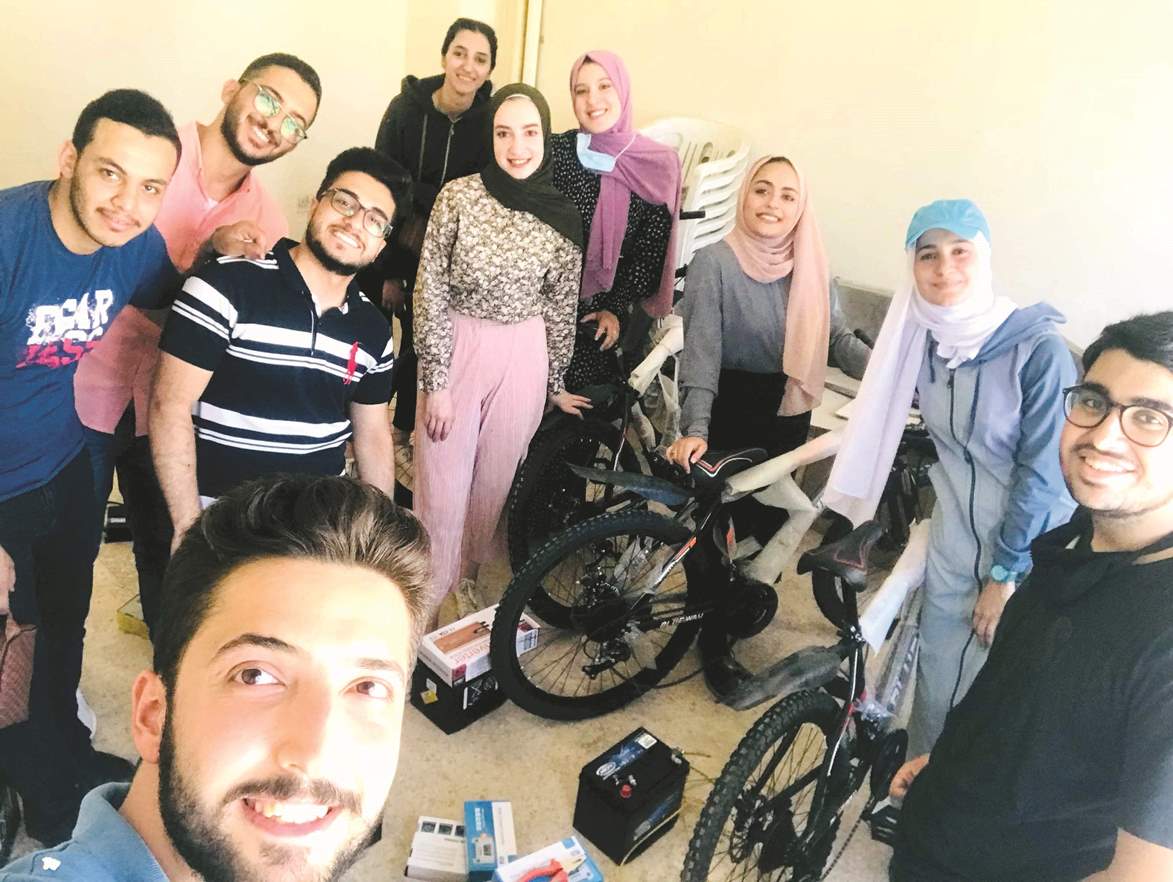AMMAN — Technology and engineering
students from
Al-Balqa Applied University (BAU) have been working on a
sustainable, eco-friendly, as well as healthy solution of power outages in refugee
camps.
اضافة اعلان
 A team of students from Balqa Applied University have created bicycle-generated power batteries to address constant power outages at Zaatari refugee camp, in Mafraq. (Photos: Handouts from SIGHT)
A team of students from Balqa Applied University have created bicycle-generated power batteries to address constant power outages at Zaatari refugee camp, in Mafraq. (Photos: Handouts from SIGHT)
According to official figures, Jordan
hosts more than 1.3 million Syrian refugees.
In Zaatari Camp in Mafraq, home to almost
80,000 Syrian refugees, a student team from BAU has found that constant power
outages is a prominent issue for camp residents, according to Heba Al-Qadoomi, a
telecommunication engineering senior student at BAU who is heading the project
team.
 A team of students from Balqa Applied University have created bicycle-generated power batteries to address constant power outages at Zaatari refugee camp, in Mafraq. (Photos: Handouts from SIGHT)
A team of students from Balqa Applied University have created bicycle-generated power batteries to address constant power outages at Zaatari refugee camp, in Mafraq. (Photos: Handouts from SIGHT)
“After extensive research, we discovered
that per day, there are six to eight hours of power outage in the camp,” said
Qadoomi. “Electricity is a basic right. Besides those studying and working
online, there are patients who live on medical devices,” she highlighted.
Youth make up a huge segment of the camp’s
population, according to Qadoomi, “so we thought that we must employ and make
use of these energies in which they (young people) can let off steam, but at
the same time generate the electricity they need.”
The main mechanism of their project,
according to Qadoomi, is transforming mechanical energy generated from bicycle
movement into electrical power, stored in batteries or chargeable units for
direct or later use.
Their initiative, dubbed “Get Fit and
Gain Power,” is like “killing two birds with one stone,” said Omar Salameh, an
electrical engineer and BAU alumni, who acted as a mediator and supervisor on
the project.
The idea not only solves the issue of
electricity, but also promotes a healthy lifestyle among people in the camp,
encouraging them to exercise daily to generate the power they need, he said.
“Through visits to the camp, in coordination
with the camp’s management and the Ministry of Interior, the students examined
the actual validity and feasibility of the project, as well as the level of
acceptance for the project among the refugee community,” said Salameh.
“After positive feedback from people and
stakeholders, we got the green light to start,” Salameh continued.
Currently equipped with seven ready to
operate bicycles, Qadoomi said that they can provide backup power for at least
seven families.
The BAU student team, members of an
academic community dubbed SIGHT (Special Interest Group on Humanitarian
Technology), got their funding from the Institute of Electrical and Electronics
Engineers (IEEE), an international professional association for electronic
engineering and electrical engineering.
“In SIGHT, we aim to utilize technology
and engineering in providing solutions for humanitarian issues faced by our society
in Jordan,” said Qadoomi.
Khaled Tobasy, a telecommunication
engineer student acting as the project’s treasurer, said that the project cost
around $4,000, which was financed by the IEEE.
According to Tobasy, the purchase phase
of the project constituted a real challenge for the team. “The COVID-19
pandemic has slowed down the process, especially when it comes to finding and
importing high-quality items and equipment for the project,” Tobasy said.
The project is a sustainable one, according
to Salameh, who explained that it neither requires operational costs or resource
consumption, adding that the life span of items used for the project is between15
to 20 years at least.
It is also an eco-friendly project that
provides a “clean energy source that relies on renewable resources, far from the
use of harmful gas or fuel,” Salameh added.
The initiative is scalable; the team has already
shared their proposed plans for future development and enhancement, including
supporting electrical units with solar panels, in addition to extra bicycles to
increase efficiency and serve more users. The project can also be expanded to
include other camps and impoverished, remote areas, Salameh added.
After a year of collaborative work, the
mediator announced that the units are stored and ready to be in the camp soon.
“We are currently working with the management and ministry to put them into operation.”
Everything from calculations,
implementations, and designing is the effort of the team under the supervision
of experts and college professors, Salameh noted.
As the team has access to funding of up
to $60,000, they stressed that they welcome all technological ideas and
collaborations that might benefit the local community.
“We encourage everyone, inside or outside
college borders to share their ideas that might aid in improving living
conditions for the disadvantaged, as our team is willing to support on all
levels,” Salameh concluded.
Read more Lifestyle







